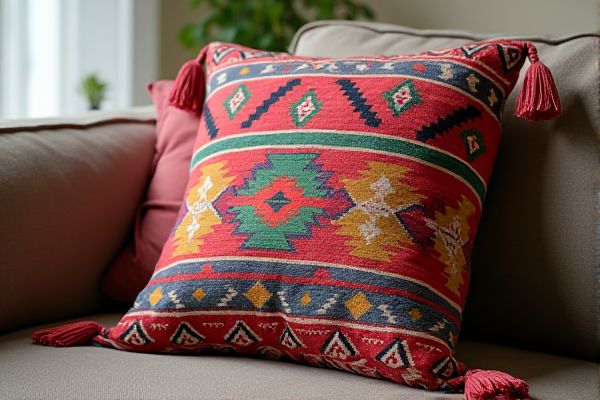
Kilim pillows offer a unique, handcrafted texture with vibrant patterns that add a rustic charm to your home decor, while velvet pillows provide a soft, luxurious feel and a sleek, elegant appearance. Discover which pillow type best suits your style and comfort needs by reading the rest of the article.
Table of Comparison
| Feature | Kilim Pillow | Velvet Pillow |
|---|---|---|
| Material | Handwoven wool, cotton | Soft velvet fabric (usually polyester or silk blend) |
| Texture | Rough, textured weave | Smooth, plush surface |
| Design | Traditional, geometric patterns | Solid colors or subtle designs |
| Durability | Highly durable, long-lasting | Moderate; can wear out with frequent use |
| Maintenance | Spot clean or dry clean | Machine washable or spot clean |
| Use | Decorative, rustic and ethnic style | Elegant, modern decor |
| Price Range | Moderate to high | Low to moderate |
Introduction: Kilim Pillow vs Velvet Pillow
Kilim pillows feature handwoven, durable wool with vibrant geometric patterns inspired by traditional Anatolian designs, adding a rustic and ethnic charm to home decor. Velvet pillows, crafted from soft, plush fabric, offer a luxurious texture and rich color depth that enhances modern and elegant interiors. Choosing between Kilim and velvet pillows depends on desired aesthetics, durability, and tactile experience.
Material Origins: Kilim and Velvet Explained
Kilim pillows originate from handwoven flat tapestry rugs made of natural wool fibers, crafted traditionally by Turkish and Persian artisans, offering a textured, durable surface with ethnic patterns. Velvet pillows, derived from silk, cotton, or synthetic fibers, feature a plush, smooth pile created by weaving two layers of fabric, resulting in soft, luxurious comfort. Your choice depends on whether you prefer the rustic authenticity and cultural heritage of Kilim or the elegant softness of velvet material origins.
Texture and Feel: Comparing Comfort Levels
Kilim pillows feature a coarse, woven texture made from natural fibers, offering a firm and rustic feel ideal for adding cultural authenticity and tactile interest to home decor. Velvet pillows provide a smooth, soft surface with a plush, luxurious touch, delivering enhanced comfort and a cozy sensation perfect for relaxation. The choice between Kilim and velvet pillows hinges on personal preference for either the sturdy, textured firmness of Kilim or the velvety softness that promotes maximum comfort.
Visual Appeal: Patterns and Color Options
Kilim pillows feature vibrant, intricate geometric patterns rooted in traditional craftsmanship, offering a rich array of earthy and bold color options that enhance bohemian or rustic decor styles. Velvet pillows provide a luxurious, smooth texture with a wide spectrum of solid colors, contributing to a sophisticated and elegant visual appeal suitable for contemporary and classic interiors. Kilim's complex designs create dynamic focal points, while velvet's rich hues and subtle sheen add depth and warmth to any space.
Durability and Longevity
Kilim pillows, crafted from woven wool or cotton, offer exceptional durability due to their tightly woven construction and natural fiber strength, making them resistant to wear and fading over time. Velvet pillows, made from plush synthetic or natural fibers, provide a softer texture but tend to show signs of wear, such as matting and pilling, more quickly than Kilim pillows. For long-lasting use, Kilim pillows are preferred in high-traffic areas, while velvet pillows suit decorative purposes with moderate use.
Maintenance and Cleaning Tips
Kilim pillows require gentle cleaning using a vacuum or spot cleaning with mild detergent to maintain their intricate woven patterns without causing damage. Velvet pillows demand careful maintenance by spot cleaning stains with a soft cloth and using a fabric brush to preserve the plush texture and prevent matting. You can extend the life of both pillow types by rotating them regularly and avoiding exposure to direct sunlight, which keeps colors vibrant and materials durable.
Cost Comparison: Price Points Analyzed
Kilim pillows often come at a higher price point due to their handcrafted nature and use of authentic, vintage textiles, reflecting artisanal craftsmanship and cultural heritage. Velvet pillows generally offer a more budget-friendly option, with soft textures and a wide range of colors available at various price levels, making them accessible for different budgets. Your choice depends on whether you prioritize unique, durable artistry or affordable, plush comfort in home decor.
Best Uses in Home Décor
Kilim pillows, with their rich textures and bold geometric patterns, are best suited for adding a rustic, bohemian touch to living rooms or cozy reading nooks, enhancing visual interest and warmth. Velvet pillows bring a luxurious, smooth finish ideal for modern, elegant spaces such as formal lounges or bedrooms, providing a soft contrast to sleek furniture. Consider your decor style and desired ambiance to choose the perfect pillow that elevates Your home's aesthetic and comfort.
Sustainability and Eco-Friendliness
Kilim pillows are crafted using traditional handwoven techniques with natural fibers like wool and cotton, making them a sustainable choice due to their biodegradable materials and low-impact production processes. Velvet pillows, often made from synthetic fibers such as polyester, tend to have a higher environmental footprint because of energy-intensive manufacturing and longer decomposition times. Choosing Kilim pillows supports eco-friendly practices by promoting artisanal craftsmanship and reducing reliance on synthetic textiles.
Final Verdict: Which Pillow Suits You Best?
Kilim pillows offer a unique, handcrafted aesthetic with durable, textured fabrics perfect for adding a rustic or bohemian touch to your decor. Velvet pillows provide a soft, luxurious feel with a sleek finish that complements modern and elegant interiors. Your choice depends on whether you prioritize artisanal charm and durability or plush comfort and sophisticated style.
 homyna.com
homyna.com